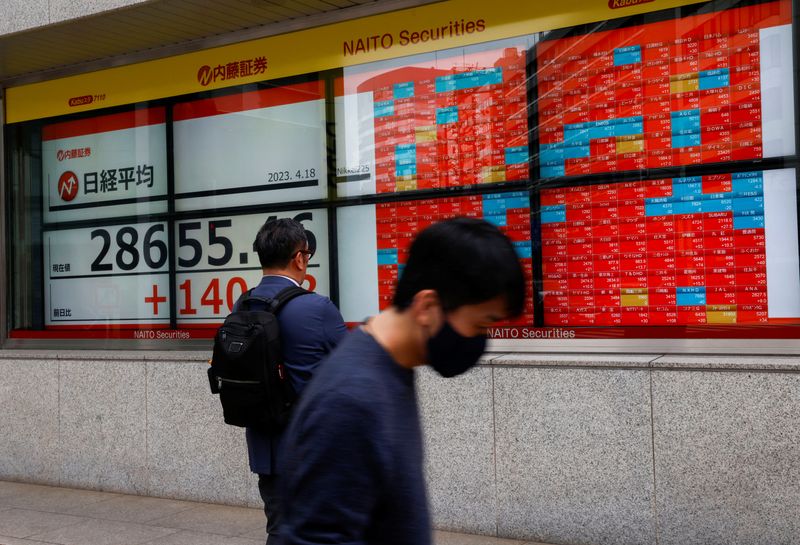By Lawrence Delevingne and Huw Jones
(Reuters) -U.S. stocks rose again and global equities hit new highs for 2023 on Thursday, while the dollar and Treasury yields continued to slide, as slowing U.S. inflation stoked bets that the Federal Reserve will pause rate hikes after this month.
Wall Street's main stock indexes built on Wednesday's sharp gains after data showed that consumer prices rose modestly in June, registering the smallest annual increase in more than two years.
Other data on Thursday showed that U.S. producer prices barely rose in June, U.S. jobless claims unexpectedly declined, and Chinese exports dropped.
The Dow Jones Industrial Average rose 0.14%, to 34,394.29, the S&P 500 gained 0.85%, to 4,509.96 and the Nasdaq Composite added 1.58%, to 14,138.57.
Bets that the Federal Reserve could soon end its monetary tightening campaign sent the dollar to its lowest level since April 2022 and pushed the yield on 10-year U.S. Treasury notes to near a two-week low.
Interest rate futures showed markets have fully priced in another rate hike from the Fed at its upcoming meeting later this month, but expectations of further increases this year have faded.
The MSCI All Country stock index was up 1.2%, hitting a new high for the year. It is up 15% so far in 2023, though it has not wiped out all of the near 20% loss in 2022.
Stocks and bonds in Asia rallied in response to the U.S. inflation news, while in Europe the STOXX index added 0.6% to Wednesday's gains, bringing its advance for the year to around 8.6%.
Market strategists at Citigroup (NYSE:C) said in a note on Thursday that slower job growth and softer-than-expected core consumer prices "finally lend some support to the Fed’s preferred narrative that supply and demand are coming into balance, allowing inflation to cool."
DISMAL CHINA DATA
Investors in Asia shook off dismal China trade data, which showed both exports and imports contracted at a worse-than-expected pace last month, betting that the latest bad news will trigger more stimulus measures.
MSCI's broadest index of Asia-Pacific shares outside Japan surged about 2%, bolstered by a 2.6% jump in Hong Kong's Hang Seng index and a 1.6% gain in Australia's resources-heavy shares. Japan's Nikkei rose 1.5%.
The International Monetary Fund said on Thursday that first-quarter global growth slightly outpaced projections in its April forecasts, but data since then has shown a mixed picture, with "pockets of resilience" alongside signs of slowing momentum.
BOND RELIEF
Bond yields were lower after a rout last week sent them sharply higher. The 10-year Treasury yield eased to 3.706%, down 10.2 basis points, having dived from a seven-month top of 4.0940% on Friday. Rate-sensitive two-year yields slipped to 4.616%, down 12.6 basis points.
The dollar index slumped to its lowest level since April 2022 on Thursday, as the cooling U.S. inflation bolstered expectations the Fed will rates only once more in 2023, eroding the greenback's yield advantage over peers.
The euro was up 0.86% to $1.122, and the Japanese yen strengthened 0.37% versus the greenback at 137.99 per dollar.
"The market is expecting that the Fed is going to hike interest rates one more time," BMO Wealth Management’s chief investment officer, Yung-Yu Ma, said in an email. "But the market does expect that that's probably where the Fed is going to stop for the rest of the year."
"We've been thinking that the Fed's going to level off around a low 5% range and stay there for some time," Ma added.

Oil prices traded near the highest levels in two months on the soft U.S. dollar. U.S. crude rose about 2% to $77.24 per barrel and Brent was at $81.68, also up around 2% on the day.
Gold prices were up 0.2% at $1,960 per ounce.